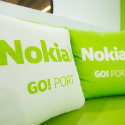The Finnish giant has engineered a clever way to drive revenues from the mobile devices sector, without getting back into phone manufacturing, thanks to a major new licensing deal.

Nokia upturned the mobile handset market Wednesday morning by announcing a major licensing deal that will see the Nokia brand used on a range of feature phones, smartphones and tablets that will be sold by HMD, a newly founded company based in Finland. (See Nokia Signs Brand Licensing Deal With HMD.)
The Finnish telecom giant quit the handset business in 2014 after completing the sale of its devices business to Microsoft Corp. (Nasdaq: MSFT), but its Technologies unit has continued to pursue technology licensing opportunities in this market.
Now the company is back in the handset game, though it's worth stressing that it has not returned to the mobile phone manufacturing market: Its strategy is more subtle than that and allows Nokia to generate revenues from the sale of mobile phones without once again becoming a device hardware firm.
The founding of, and deal with, HMD appears to have been facilitated by complicated four-way arrangements involving the two Finnish companies as well as Microsoft and Taiwan's Foxconn Electronics Inc. .
A subsidiary of Foxconn called FIH has today agreed to pay $350 million for the feature phone business assets that Microsoft bought from Nokia Corp. (NYSE: NOK) in 2014. HMD, meanwhile, is acquiring rights to use the Nokia brand from both Nokia and Microsoft as well as licensing patents from Nokia.
As a result of these transactions, which are expected to close in the second half of this year, about 4,500 Microsoft employees will be transferred to either Foxconn or HMD.
Thanks to agreements between Foxconn and HMD, the FIH business will essentially make the devices that HMD then markets under the Nokia brand. HMD has already promised to invest more than $500 million over the next three years on marketing efforts and says it will develop "a full range of Nokia-branded feature phones, smartphones and tablets."
According to a spokesperson for Nokia, HMD's investors include a private equity fund called Smart Connect LP, as well as top executives involved in the business: However, HMD is not backed by investments from Foxconn, Microsoft or Nokia.
For all the latest news from the wireless networking and services sector, check out our dedicated mobile content channel here on Light Reading.
While Nokia is not an investor in HMD, Smart Connect LP is managed by Jean-Francois Baril, who was a senior vice president at the Finnish company between 1999 and 2012. Nokia's Techologies unit, which will receive royalties from the deal with HMD, will also have a seat on the new company's five-member board.
Moreover, top executives at HMD previously worked at both Nokia and Microsoft. Arto Nummela, HMD's CEO, formerly held senior positions within Nokia and is currently the head of Microsoft's mobile devices business for Greater Asia, the Middle East and Africa, as well as being in charge of the global feature phones business. He is to quit those positions once the deal between Microsoft and HMD has gone through.
HMD President Florian Seiche is currently the senior vice president for Europe sales and marketing at Microsoft Mobile and used to have leadership roles within Nokia.
Bengt Nordström, the CEO of Swedish consulting and analyst firm Northstream, says he is not surprised by the latest news. "When Nokia sold its devices business to Microsoft their DNA was still in devices and I always said it would be hard for them to refrain from coming back," he tells Light Reading.
"This move is quite understandable because ultimately there is no growth in the telecom equipment sector -- that can be seen from the last results announcement," adds Nordström.
Following its takeover of Alcatel-Lucent at the start of the year, Nokia last week reported a 9% fall in revenues for the first three months of the year, compared with combined company revenues in the year-earlier period. (See Wireless Weakness Dents Nokia Sales, Outlook.)
The Technologies unit that will benefit from today's announcement accounted for just 3.5% of the €5.6 billion ($6.3 billion) that Nokia generated in overall sales.
The move by Nokia is being seen as positive by investors as the Finnish vendor's share price is up by 2% on the Helsinki exchange.
— Iain Morris, 

 , News Editor, Light Reading
, News Editor, Light Reading
About the Author(s)
You May Also Like











